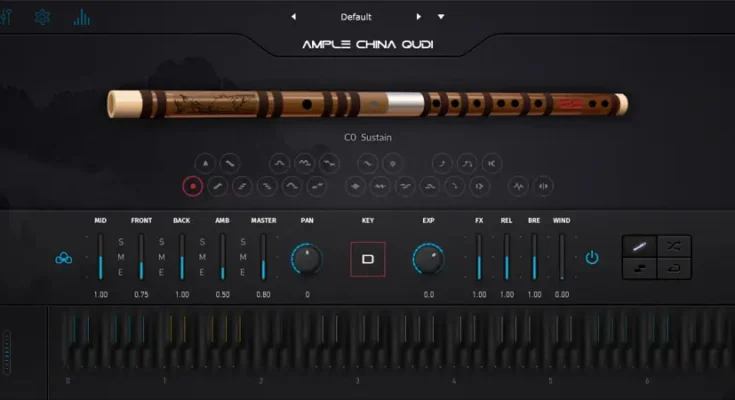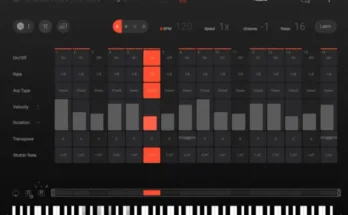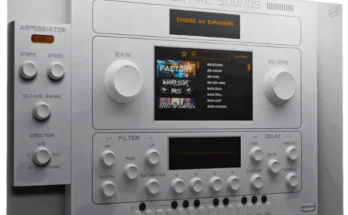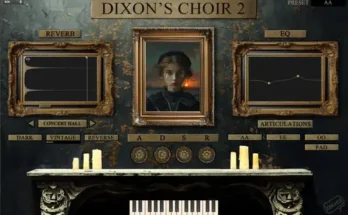Ample China Qudi v1.5.1-R2R
Team R2R | 2024.12.02 | 3.4 GB
Ample China Qudi (ACQD) is built on the latest development of the Woodwind Sample Engine, with 4.4 GB samples, including head and body articulations, FX sounds, as well as a select collection of improvised licks.
The Artist: Xiaokui Ding (China National Traditional Orchestra)
The Instrument: Elegant Wind series D key Qudi (Jianhong Wang Masterbuilt)
Sampling:
Recorded with 5 mics (Front, Middle, Back, Stereo Ambient). Each mic volume is adjustable and equipped with channel EQ.
3 Mic modes: Mono, Modern and Traditional, capable of colorful sound designs.
There are 3 kinds of articulations – Head Group (blue keyswitches), Body Group (yellow keyswithces) and Special Effect Group (red keyswitches). Each group occupies one octave.
The head group is used to perform grace notes at head. Articulations with more grace notes are assigned to higher keyswitches; Ascending and descending articulations are close together.
The body group can not only perform grace notes at head, but can also be used for articulation legatos to express changes of the sound body.
The woodwinds have great dynamic range and timbre variation. The sample library provides 5 velocity layers, with sound from mildly soft to bright and strong.
There are 4 velocity layers for Expression articulation, 2 velocity layers for Vibrato articulation, and real samples of Trill sounds. Together with SAHDS virtual modulation system, they can create vivid and realistic notes.
Note velocity is used to control the start time of Expression and Vibrato articulations, to generate slowly developing notes or strong notes.
The sample length is about 8 seconds on average. In most cases, it can meet the requirements of a note. If longer notes are needed, users can turn on the Sample Loop function.
Features
Intelligent Legato System
The Auto Legato System detects the duration of each note. For legatos whose duration is less than this value, only the straight legato will be triggered to ensure that no unwanted grace notes are generated during fast performance.
When note duration is longer than Legato Time:
Velocity(126-127) Triggers Layering Legato (Ascending) and Ripple Legato(Descending)
Velocity(96-125) triggers Grace Legato
Velocity(32-96) triggers Straight Legato
Velocity(16-31) triggers Soft Legato 1
Velocity(1-15) triggers Soft Legato 2
In Slide Legato mode, low velocity triggers slide notes.
In the real performance of the Woodwind, the legatos are ever-changing, sometimes hard and sometimes soft. Legatos with no changes cannot completely simulate real performance.
Hold pedal can be used to turn on Double Legato Mode.
Endless Articulation Legato:
The body group can be used for endless articulation legatos. For example, you can start with a Sustain, hold the note, then play the Expression Keyswitch (C1) to play legato to an Expression note; then play Marking keyswitch (E1) to play legato to a Marking note, and then press Laying keyswitch (F1) to play legato to a Laying note, and so on.
Creative Mirroring Feature:
Playing the keyswitch when a note is sounding will reverse the sample at current position. It changes for example a Slide Up to Slide Down, or a Slow-Fast Vibrato to Fast-Slow Vibrato. It can also be used to control the sustained body of notes like Expression.
Voice independent SAHDS Modulation System:
Each voice has its on SAHDS modulation envelope.
You can get natural and realistic vibratos while keeping the Mod wheel in one position.
The mod speed, gain, and pitch can also be adjusted.
Adjustable Wind Effect:
The Wind is the sound of air blowing in the Woodwind tube. We extracted this sound from each real sample to enable the independent control of this element.
The sound of the woodwind without the Wind is very pure. Moderately control the volume of the Wind, and make some changes during the performance, can increase the feeling of “dirty” and breath, and improve the realism.
Other new features include sample skipping technology, random articulation, keyboard mode for playing chords etc.
FX:
High order 8-band EQ, intuitive control of frequency response, real-time visualization of input and output spectrum, support of soloing single band..
2-Line Compressor, real-time visualization of input and output signal, two detection modes RMS & Peak, support of soft knee, auto release and auto makeup.
6-Tap Echo, real-time visualization of the processing of stereo signal, can tweak the parameters of 6 echo points individually: feedback, pan, volume etc.
IR Reverb, providing four types of IR: Room, Studio, Hall, and Larger Hall. 3D visualization of IR spectrum.
Please REPORT Broken Links in the Comment




